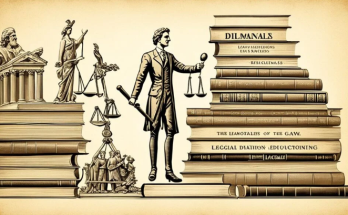Introduction
The Role of an Attorney in the Legal System, In any well-working society, lawyers act as the foundation of the general set of laws, assuming crucial parts in maintaining equity, addressing clients, and guaranteeing fair legitimate cycles. From prompting people and organizations on complex legitimate issues to addressing them in court, lawyers are fundamental to protecting the freedoms and interests of all gatherings included. In this article, we dig into the basic capabilities lawyers act in the general set of laws, investigating their obligations, sorts of training regions, and the abilities important for compelling legitimate portrayal. The Role of an Attorney in the Legal System.
What is an Attorney?
A lawyer, otherwise called a legal counselor, is an authorized proficient who is approved to address clients in legitimate matters and give exhortation on a large number of issues. They are limited by moral guidelines, severe sets of principles, and a pledge to equity. Lawyers go through thorough instruction and preparing to guarantee they are prepared to deal with different parts of the law, from criminal cases to common questions. Contingent upon the ward, lawyers should finish a bar assessment and satisfy proceeding with training prerequisites to keep up with their licenses.
Key Liabilities of Lawyers in the Legitimate System
1. Addressing Clients in Lawful Proceedings
One of the essential jobs of a lawyer is to go about as a supporter for their clients in court. Whether in criminal, common, or managerial procedures, lawyers address the interests of people, partnerships, and government elements. Through essential argumentation and proof show, they expect to safeguard their client’s freedoms and accomplish ideal results.
- Criminal Cases: In criminal regulation, lawyers fill in as either guard legal advisors or examiners. Safeguard lawyers expect to support their clients against criminal allegations, while examiners address the public authority in accusing people of violations.
- Common Cases: In common suit, lawyers address clients in questions including financial harms, property, and individual freedoms. They work to either look for remuneration for wrongs or support clients against claims.
- Regulatory Hearings: Lawyers additionally address clients in non-legal hearings, for example, work questions, federal retirement aide cases, and movement cases, pushing for their benefit before authoritative sheets and offices. The Role of an Attorney in the Legal System.
2. Offering Legitimate Guidance and Consultation
Another indispensable job lawyers play is giving legitimate exhortation to people and organizations. Clients look for counsel for different lawful inquiries, from understanding agreements and arrangements to exploring complex administrative issues. This part of a lawyer’s occupation incorporates:
- Deciphering the Law: Lawyers assist clients with understanding the complexities of legitimate standards and guidelines pertinent to their conditions, guaranteeing consistence with the law.
- Contract Drafting and Review: Lawyers draft, survey, and arrange contracts for their clients, guaranteeing all agreements are legitimately solid and safeguard their client’s advantages.
- Risk Appraisal and Mitigation: Lawyers exhort clients on expected legitimate dangers and propose systems to limit openness, along these lines forestalling future legitimate issues.
3. Maintaining Moral Guidelines and Guaranteeing Justice
Lawyers are limited by a severe set of principles and a guarantee to maintain equity inside the overall set of laws. They have an obligation to address their clients with respectability, trustworthiness, and steadiness while regarding the privileges of all gatherings included. This moral obligation incorporates:
- Confidentiality: Lawyers should keep up with client classification, guaranteeing that delicate data stays private.
- Struggle of Interest: Lawyers are committed to stay away from irreconcilable circumstances that could think twice about capacity to dispassionately address clients.
- Obligation of Competence: Lawyers should have the vital information, expertise, and readiness with deal with legitimate matters really, complying to a norm of expert skill.
Kinds of Lawyers and Practice Areas
Lawyers have some expertise in different practice regions, each requiring extraordinary abilities and information. The absolute most normal sorts include:
1. Criminal Safeguard Attorneys
Criminal safeguard lawyers address clients blamed for perpetrating wrongdoings, attempting to get vindications, diminished sentences, or supplication deals. They examine the case, accumulate proof, and art guard procedures while guaranteeing their clients’ sacred freedoms are safeguarded.
2. Family Regulation Attorneys
Family regulation lawyers handle legitimate issues including family connections, like separation, youngster care, reception, and support. These cases are frequently sincerely charged, expecting lawyers to practice empathy and a profound comprehension of family regulation.
3. Corporate Attorneys
Corporate lawyers, or business attorneys, center around legitimate issues connected with organizations and companies, including consolidations and acquisitions, corporate administration, and consistence with guidelines. They assume a huge part in organizing agreements and limiting legitimate gamble for their clients.
4. Individual Injury Attorneys
Individual injury lawyers advocate for people harmed because of the carelessness or bad behavior of others. They look for remuneration for their clients’ clinical costs, lost compensation, and different harms, frequently haggling with insurance agency or disputing cases in court.
5. Licensed innovation Attorneys
Licensed innovation (IP) lawyers safeguard clients’ licensed innovation freedoms, including licenses, copyrights, and brand names. These lawyers assist organizations with shielding their advancements, image characters, and imaginative works, which are important resources in the present serious market.
The Significance of Legitimate Information and Skills
To succeed in the legitimate calling, lawyers should have a different arrangement of abilities and a solid information base. Here are a few basic capacities that improve a lawyer’s viability:
1. Solid Insightful and Basic Thinking
Lawyers should dissect huge measures of data, recognize main points of contention, and foster consistent, convincing contentions. Their scientific abilities are urgent in deciphering regulations, building cases, and using wise judgment under tension.
2. Compelling Communication
Whether arranging settlements, questioning observers, or conveying shutting contentions, lawyers depend vigorously on their relational abilities. Both oral and composed capability are essential, as lawyers should pass complex legitimate ideas plainly on to judges, juries, clients, and restricting advice.
3. Research Skills
Lawful examination is central to building a strong case. Lawyers should examine case regulation, resolutions, and guidelines applicable to each case. Solid examination abilities empower lawyers to track down points of reference and proof that help their clients’ positions.
4. Discussion and Struggle Resolution
Lawyers habitually haggle for the benefit of their clients, whether resolving a question out of court or drafting a positive agreement. Viable discussion abilities are pivotal for accomplishing helpful results and staying away from delayed suit.
5. Authoritative Skills
Dealing with various cases, cutoff times, and authoritative archives requires excellent hierarchical abilities. Lawyers need to focus on assignments and keep up with fastidious records to keep cases on target and offer productive assistance to clients.
How Lawyers Maintain the Legitimate System
Lawyers are fundamental to the equity framework, guaranteeing that regulations are applied decently and reliably. Through their work, they:
- Safeguard Individual Rights: Lawyers go about as a cradle between the public authority and people, defending the freedoms conceded by regulation.
- Advance Legitimate Integrity: By sticking to moral norms and guaranteeing fair portrayal, lawyers improve public trust in the overall set of laws.
- Give Admittance to Justice: Lawyers assist people from all foundations with exploring complex legitimate cycles, making the equity framework open to everybody.
Conclusion
Lawyers serve an important job in the overall set of laws, from addressing clients in court to prompting them on legitimate matters and maintaining moral principles. Their insight, devotion, and expertise add to a reasonable legitimate structure that safeguards the privileges of people and substances the same. Through their work, lawyers represent their clients as well as advance law and order, fundamental for a fair and working society.



